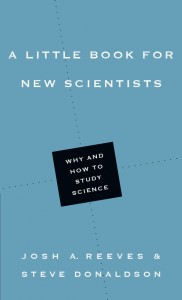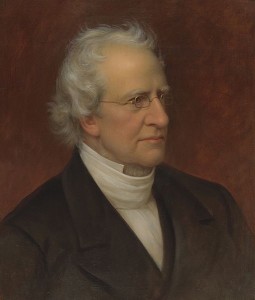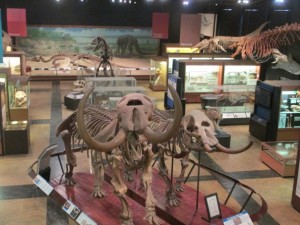 The final section of A Little Book for New Scientists: Why and How to Study Science by Josh Reeves and Steve Donaldson looks at the interplay between science and Christian faith – particularly science and Scripture, the impression that most scientists are atheists, and the calling to be scientists for the good of the church. There is much good advice in this section. I will highlight only a few points, skipping altogether the chapter on the claim that most scientists are atheists. (Read the book – it is well worth the price and time.)
The final section of A Little Book for New Scientists: Why and How to Study Science by Josh Reeves and Steve Donaldson looks at the interplay between science and Christian faith – particularly science and Scripture, the impression that most scientists are atheists, and the calling to be scientists for the good of the church. There is much good advice in this section. I will highlight only a few points, skipping altogether the chapter on the claim that most scientists are atheists. (Read the book – it is well worth the price and time.)
On Science and Scripture. There are many issues here and few that can be adequately addressed in a short guide for new scientists. Reeves and Donaldson instead focus on four principles that should guide our approach to Scripture as we wrestle with the text and consider the implications of science.
Principle 1: Having the Holy Spirit as our teacher does not make us infallible.
But faithful Christian interpreters must also remember: an uncompromising commitment to the inspiration and authority of Scripture does not mean we should have an uncompromising commitment to our own interpretations of Scripture. Because we are sinners with imperfect knowledge and motives, we must always be open to the possibility that we have interpreted a verse or passage incorrectly. (p. 94)
Intellectual humility any one? This is a critical point. We must be immersed in Scripture, open to the leading of the Spirit, and attentive to the insight gained by Christian scholars as the seek to understand the ancient language and culture of the original text.
Principle 2: We must read the Bible in community.
We should have little hope of interpreting the Bible well without the assistance of others, just as there is little hope of becoming a scientist on one’s own. The best way to think about our relationship to Scripture is in terms of discipleship, where one’s ability to read the Bible is slowly transformed under the guidance of others, just as Jesus gathered around him a community of followers in order to lead them to a fuller understanding of the truth. … As one seeks to puzzle out ways of reconciling science and Scripture, it is of the utmost importance to find quality teachers, those who combine intellectual rigor with the virtues that come with a life of Christian faith. (p. 98)
No person is an island capable of all knowledge, wisdom and insight. We all thrive and grow much better in healthy Christian community.
Principle 3: Not just a literal interpretation.
 It is not possible to be faithful to the message of Scripture with a “literal only” approach. What we see as the “literal” meaning is often shaped by our own assumptions and expectations rather than by the intent of the original authors. It is quite possible that what we believe we read out of the text is really only a reflection of the assumptions we bring to the text.
It is not possible to be faithful to the message of Scripture with a “literal only” approach. What we see as the “literal” meaning is often shaped by our own assumptions and expectations rather than by the intent of the original authors. It is quite possible that what we believe we read out of the text is really only a reflection of the assumptions we bring to the text.
The recognition that interpretation is always an interplay between the text and our assumption should drive us to interpret the Bible with humility and charity and motivate us to consider other positions with openness. Failure to read the Bible with humility might not only lead one to make interpretative errors, but it can also undercut the witness of the larger church. … The ability to read the Scripture for ourselves is undoubtedly a good thing, but the quarrelsomeness and factions that come with Bible reading have been a negative witness of the church. (pp. 99-100)
The multitude of denominations and the rather spirited and nasty disagreements that can result give us a bad name in the wider world.
Principle 4: To know what the Bible means for us today, we should first understand what it meant to its original audience.
The reason modern readers have to understand the context of a biblical passage is that God’s revelation is accommodated to the understanding of those who first heard it. The principle of accommodation says that God communicated revelation in terms that the audience of the day will understand. (p. 102)
This is not a new idea and Reeves and Donaldson point out that Augustine, Thomas Aquinas, and John Calvin all affirmed this approach. God was as concerned with the understanding and formation of the original audience as he is with our understanding and formation. Among other things, this means that we should not expect to find modern science in the ancient text. Some principles, such as a beginning to human time, may be present – but this isn’t a hidden reference to the big bang.
 Reeves and Donaldson quote Charles Hodge (a staunch defender of the inspiration of Scripture) from his Systematic Theology Vol. 1. A PDF file is available is available online at this link and likely elsewhere as well. I quote a little more extensively than included by Reeves and Donaldson on p. 103 of their book:
Reeves and Donaldson quote Charles Hodge (a staunch defender of the inspiration of Scripture) from his Systematic Theology Vol. 1. A PDF file is available is available online at this link and likely elsewhere as well. I quote a little more extensively than included by Reeves and Donaldson on p. 103 of their book:
This of course does not imply that the sacred writers were infallible except for the special purpose for which they were employed. They were not imbued with plenary knowledge. As to all matters of science, philosophy, and history, they stood on the same level with their contemporaries. They were infallible only as teachers, and when acting as the spokesmen of God. Their inspiration no more made them astronomers than it made them agriculturists. Isaiah was infallible in his predictions, although he shared with his countrymen the views then prevalent as to the mechanism of the universe. (p. 165)
Later:
We must distinguish between what the sacred writers themselves thought or believed, and what they teach. They may have believed that the sun moves round the earth, but they do not so teach. … There is also a distinction to be made between the Bible and our interpretation. The latter may come into competition with settled facts; and then it must yield. Science has in many things taught the Church how to understand the Scriptures. The Bible was for ages understood and explained according to the Ptolemaic system of the universe; it is now explained without doing the least violence to its language, according to the Copernican system. Christians have commonly believed that the earth has existed only a few thousands of years. If geologists finally prove that it has existed for myriads of ages, it will be found that the first chapter of Genesis is in full accord with the facts, and that the last results of science are embodied on the first page of the Bible. It may cost the Church a severe struggle to give up one interpretation and adopt another, as it did in the seventeenth century, but no real evil need be apprehended. (p. 171)
Part of understanding the meaning for the original audience we must seek to understand the message that the writers intended to teach. For example, they may have assumed the earth stood on pillars with a vault above, but they did not teach that the earth stood on pillars with a vault above. They taught that God created all with his word and humans in his image.This stood against the surrounding culture with visions of the sun, moon and stars as deities, earth created out of divine violence, and humans designed to labor so that the gods wouldn’t have to work. The writers were given superior spiritual knowledge not superior scientific knowledge. Frankly, for us as Christians spiritual knowledge is far more important than scientific knowledge.
Are there any principles you would revise or add?
 Science for the good of the church. This leads us nicely to the last chapter of the book. The church needs faithful scientists for the good of the church. Tunnel vision, ignoring the scientific endeavor will render the church irrelevant in an increasingly educated society. It isn’t that science is all that important for our message, but that we need to be able to speak into our communities. Modern science shapes the worldview of our culture in many ways. “The more informed and conversant Christians become in areas that are touched by both scientific and theological reflection, the more they can contribute from these particular vantage points to the overall ministry objectives of the church.” (p. 123)
Science for the good of the church. This leads us nicely to the last chapter of the book. The church needs faithful scientists for the good of the church. Tunnel vision, ignoring the scientific endeavor will render the church irrelevant in an increasingly educated society. It isn’t that science is all that important for our message, but that we need to be able to speak into our communities. Modern science shapes the worldview of our culture in many ways. “The more informed and conversant Christians become in areas that are touched by both scientific and theological reflection, the more they can contribute from these particular vantage points to the overall ministry objectives of the church.” (p. 123)
Among other things …
Christian scientists and scholars can help to educate ministers and congregations from their expertise and Christian perspective. Ill-formed opinions do not serve us well.
Cultivating a richer, deeper engagement between science and Christian thinking can help church members better understand the importance of integrating these areas, both with respect to their own spiritual development and to how they are perceived by those outside the church. (p. 124)
Christian scientists and scholars can “knock down barricades and build bridges with such marginalized people who think science has somehow eliminated the need for God.” (p. 125) This is important for the mission to reach all people for God.
Faithful Christian scientists as part of the Christian community will help us wrestle with the questions of interpretation of Scripture that are raised by modern science. The non-scientist tends to be willing to write off as unproven challenging scientific concepts that are, in fact, quite well supported. The engagement of Christians from a broad range of disciplines with a variety of expertise will help to keep us on a productive track.
 In his letter to the Romans Paul writes:
In his letter to the Romans Paul writes:
For by the grace given me I say to every one of you: Do not think of yourself more highly than you ought, but rather think of yourself with sober judgment, in accordance with the faith God has distributed to each of you. For just as each of us has one body with many members, and these members do not all have the same function, so in Christ we, though many, form one body, and each member belongs to all the others. We have different gifts, according to the grace given to each of us. If your gift is prophesying, then prophesy in accordance with your faith; if it is serving, then serve; if it is teaching, then teach; if it is to encourage, then give encouragement; if it is giving, then give generously; if it is to lead, do it diligently; if it is to show mercy, do it cheerfully. (12:3-8)
In our world today, expertise in science, social science, biblical studies and many other disciplines may well be a gift given for the good of the church.
Let us be faithful Christians and productive members of the body, using our gifts for the good of the church.
I’ve only skimmed the highlights. This book should provide a helpful resource and an excellent starting point for important conversations in our church. I recommend it as part of the repertoire for most Christian teachers, pastors, and leaders. It is an excellent book to have on hand for those contemplating a career in some field of science.
Is the study of science a gift for the church?
How should this gift be used?
If you wish to contact me directly you may do so at rjs4mail[at]att.net
If interested you can subscribe to a full text feed of my posts at Musings on Science and Theology.




